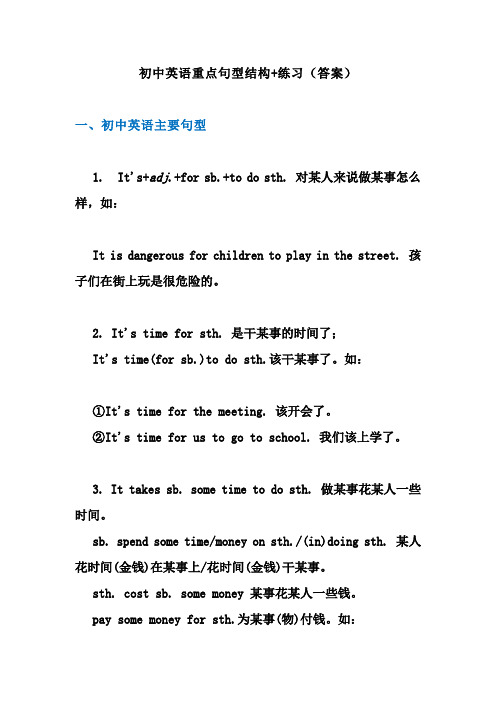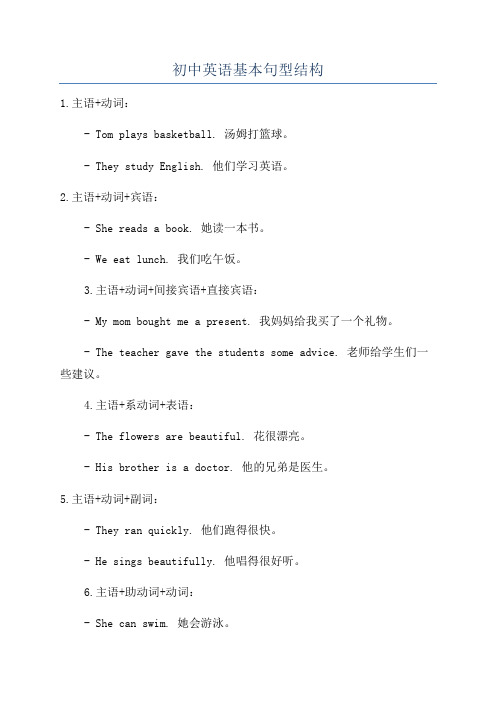初中英语重点句型结构
【最新推荐】初中英语重点句型结构

初中英语重点句型结构+练习(答案)一、初中英语主要句型1. It's+adj.+for sb.+to do sth. 对某人来说做某事怎么样,如:It is dangerous for children to play in the street. 孩子们在街上玩是很危险的。
2. It's time for sth. 是干某事的时间了;It's time(for sb.)to do sth.该干某事了。
如:①It's time for the meeting. 该开会了。
②It's time for us to go to school. 我们该上学了。
3. It takes sb. some time to do sth. 做某事花某人一些时间。
sb. spend some time/money on sth./(in)doing sth. 某人花时间(金钱)在某事上/花时间(金钱)干某事。
sth. cost sb. some money 某事花某人一些钱。
pay some money for sth.为某事(物)付钱。
如:① It took me two hours to write the letter. 写这封信花了我两小时的时间。
②He spends half an hour(in)reading English every morning.他每天早上花半小时读英语。
③ He spends one hour on the housework every day. 他每天花一小时做家务。
④ The bike cost me 500 yuan. 这辆自行车花了我500元。
⑤ I spent 500 yuan on the bike. 我买这辆自行车花了500元。
⑥ I paid 500 yuan for the bike. 我花了500元买这辆自行车。
初中英语重点句型结构

初中英语重点句型结构
1.主语+动词+宾语
例如:I like playing basketball.
2.主语+动词+不定式
例如:She wants to learn how to play the guitar.
3.主语+动词+形容词
例如:He is tall.
4.主语+动词+名词
例如:They enjoy swimming.
5.主语+动词+副词
例如:The dog runs quickly.
6. 主语 + be + 形容词
例如:She is happy.
7. 主语 + be + 名词
例如:He is a doctor.
8. 主语 + be + 动词 -ing
例如:They are studying.
9.一般疑问句:助动词+主语+主谓倒装
例如:Do you like ice cream?
10.特殊疑问句:疑问词+助动词+主语+谓语
例如:Where do you live?
11. 否定句:主语 + 助动词 + not + 动词
例如:She does not like swimming.
12.祈使句:动词+其他成分
例如:Shut the door.
13. There be 句型:There + be动词 + 名词例如:There is a cat.。
初中英语基本句型结构

初中英语基本句型结构1.主语+动词:- Tom plays basketball. 汤姆打篮球。
- They study English. 他们学习英语。
2.主语+动词+宾语:- She reads a book. 她读一本书。
- We eat lunch. 我们吃午饭。
3.主语+动词+间接宾语+直接宾语:- My mom bought me a present. 我妈妈给我买了一个礼物。
- The teacher gave the students some advice. 老师给学生们一些建议。
4.主语+系动词+表语:- The flowers are beautiful. 花很漂亮。
- His brother is a doctor. 他的兄弟是医生。
5.主语+动词+副词:- They ran quickly. 他们跑得很快。
- He sings beautifully. 他唱得很好听。
6.主语+助动词+动词:- She can swim. 她会游泳。
- They should study harder. 他们应该更加努力学习。
7.主语+情态动词+动词:- We must go now. 我们必须现在出发。
- You should listen to your parents. 你应该听父母的话。
8.主语+谓语+介词短语:- The cat is on the table. 猫在桌子上。
- We live in a big city. 我们住在一个大城市里。
9.反意疑问句:- You are a student, aren't you? 你是学生,不是吗?- They can swim, can't they? 他们会游泳,对吗?这些是初中英语基本句型结构的常见例子,可以根据需要进行变化和扩展。
初中英语句子结构和句型分析及细致讲解

初中英语句子结构和句型分析及细致讲解初中英语句子结构和句型是学习英语的基础。
下面我将为你详细讲解,并配以丰富的例句,帮助你更好地理解。
初中英语句子结构及句型详解一、句子成分英语句子主要由以下成分组成:•主语(Subject):句子所陈述的主体,通常是名词或代词。
例:I like apples.(我喜欢苹果。
)•谓语(Predicate):表示主语的动作或状态,通常是动词。
例:She is reading a book.(她正在看书。
)•宾语(Object):动作的承受者,通常是名词或代词。
例:He bought a car.(他买了一辆车。
)•定语(Adjective):修饰名词或代词,表示其性质或特征。
例:This is a beautiful flower.(这是一朵美丽的花。
)•状语(Adverb):修饰动词、形容词或副词,表示时间、地点、方式等。
例:He runs very fast.(他跑得很快。
)•补语(Complement):补充说明主语或宾语的状态或特征。
例:They made him happy.(他们使他高兴。
)二、句子种类根据句子结构和意义,英语句子可分为以下几类:•简单句(Simple Sentence):只有一个主谓结构的句子。
例:I like English.(我喜欢英语。
)•并列句(Compound Sentence):由两个或两个以上的简单句用并列连词(and, but, or等)连接而成。
例:I like apples, and she likes bananas.(我喜欢苹果,她喜欢香蕉。
)•复合句(Complex Sentence):由一个主句和一个或多个从句组成。
例:When I go home, I will do my homework.(当我回家时,我将做作业。
)三、句子类型•陈述句(Declarative Sentence):用来陈述事实或观点。
例:He is a student.(他是一个学生。
初中英语句型及总结归纳

初中英语句型及总结归纳英语是我们学习的一门重要课程,而句型是英语中的基础。
在初中英语学习中,我们掌握了许多常用的句子结构,这些句型在日常交流和写作中都起到了关键的作用。
本文将对初中英语的句型进行总结归纳,帮助大家更好地掌握和运用这些句型。
一、陈述句陈述句是我们最常用的句子类型,用来陈述事实、描述情况。
以下是一些常见的陈述句型:1. 主语 + 动词 + 宾语例如:I like pizza.(我喜欢比萨。
)2. 主语 + be动词 + 表语例如:She is a teacher.(她是一名教师。
)3. 主语 + do/does + 动词原形例如:They do their homework every day.(他们每天做作业。
)4. 主语 + have/has + 过去分词例如:He has finished his homework.(他已经完成了作业。
)二、疑问句疑问句用于提问,帮助我们获取信息。
以下是一些常见的疑问句型:1. 疑问词 + 助动词 + 主语 + 动词?例如:What do you like?(你喜欢什么?)2. 助动词 + 主语 + 动词?例如:Do you play basketball?(你打篮球吗?)3. 特殊疑问句例如:Where did you go yesterday?(你昨天去哪里了?)三、祈使句祈使句用于表达请求、命令或建议。
以下是一些常见的祈使句型:1. 动词原形 + 其他成分例如:Open the window, please.(请打开窗户。
)2. 动词原形 + 不定代词/名词例如:Eat some fruit.(吃些水果。
)四、感叹句感叹句用于表达惊讶、赞美、喜悦等情感。
以下是一些常见的感叹句型:1. How + 形容词/副词 + 主语 + 动词!例如:How beautiful the flowers are!(花儿多美啊!)2. What + 形容词 + 名词 + 主语 + be动词!例如:What a lovely dog he has!(他有一只多可爱的狗啊!)五、条件句条件句用于表达假设、条件和结果之间的关系。
初中英语句型结构

初中英语句型结构1. 主谓结构主谓结构是英语中最基本的句型结构,由主语和谓语组成。
主语通常是名词或代词,谓语则是动词。
这种句型常用于陈述事实和描述行为。
例如:- My sister studies English every day.(我的姐姐每天研究英语。
)- They play soccer in the park.(他们在公园踢足球。
)2. 主谓宾结构主谓宾结构是由主语、谓语和宾语组成的句型结构。
主语执行动作或进行状态,而宾语是动作的承受者或影响者。
例如:- My brother eats an apple every morning.(我弟弟每天早晨吃一个苹果。
)- She reads a book in the library.(她在图书馆读书。
)3. 主系表结构主系表结构是由主语、系动词和表语组成的句型结构。
系动词连接主语和表语,用来描述或说明主语的状态或特征。
例如:- The soup smells delicious.(这汤闻起来很好吃。
)- The flowers look beautiful.(那些花看起来很美。
)4. There be结构There be结构用于描述存在某人或某物的情况,其中"There be"是固定用法,后接主语和谓语。
例如:- There is a cat in the garden.(花园里有一只猫。
)- There are many books on the shelf.(书架上有很多书。
)5. 宾语从句结构宾语从句是一个句子,用作另一个句子的宾语。
宾语从句通常由连接词引导,如that, if, whether等。
例如:- She asked me if I had finished my homework.(她问我是否完成了作业。
)- Do you know where he lives?(你知道他住在哪里吗?)6. 状语从句结构状语从句用来修饰主句中的谓语动词,描述时间、地点、原因、条件等的关系。
初中英语语法归纳句型结构
初中英语语法归纳句型结构1.主语+谓语动词-主语是句子的主要成分,表示做出动作或承受动作的人或事物。
-谓语动词是指主语所做的动作或存在的状态。
例句:She sings beautifully.(她唱得很好听。
)2.主语+谓语动词+宾语-宾语是指主语所做动作的对象或从句。
-可以是名词、代词、动词不定式等。
例句:He bought a new car.(他买了一辆新车。
)3.主语+谓语动词+宾语+宾补-宾补是补充说明宾语的成分,通常是形容词、名词、副词等。
-宾补一般是由系动词或使役动词引导的。
例句:I found him tired.(我发现他很疲倦。
)4.主语+谓语动词+间接宾语+直接宾语-间接宾语表示动作的接受者或受益者。
-直接宾语表示动作的直接对象。
例句:She gave me a present.(她给了我一份礼物。
)5.主语+谓语动词+宾语+宾语补足语-宾语补足语用来补充说明宾语的成分,通常是名词、形容词、介词短语等。
例句:They elected him president.(他们选他为总统。
)6.主语+系动词+表语-表语通常是形容词、名词、代词、副词等。
例句:She is a teacher.(她是一名教师。
)7.主语+系动词+双宾语-双宾语结构包括直接宾语和间接宾语,直接宾语是动作的直接对象,间接宾语表示动作的受益者或接受者。
例句:He bought his mother a gift.(他给他妈妈买了一份礼物。
8.主语+系动词+表语+补足语-表语用来补充说明系动词和主语之间的关系,补足语通常是名词、形容词等。
例句:She became a doctor.(她成为了一名医生。
)9.主语+动词+副词-副词作为动词的修饰成分,用来修饰动词的方式、程度、时间、地点等。
例句:He ran quickly.(他跑得很快。
)10.主语+动词+动词补语-动词补语通常是形容词、名词、副词或介词短语,用来说明或补充说明主语的状态、特征、身份等。
初中英语句式结构分类大全
初中英语句式结构分类大全1. 主谓结构(Subject-Verb Structure):- 主语 + 系动词 + 表语:The book is interesting.- 主语 + 及物动词:They play soccer every day.- 主语 + 及物动词 + 宾语:She loves her dog.2. 主谓宾结构(Subject-Verb-Object Structure):- 主语 + 及物动词 + 直接宾语 + 间接宾语:He gave me a present.- 主语 + 及物动词 + 直接宾语:They eat apples.- 主语 + 及物动词 + 宾语 + 宾语补语:We found the movie interesting.- 主语 + 不及物动词 + 宾补:She became a teacher.- 主语 + 系动词 + 表语:The flowers are beautiful.- 主语 + 系动词 + 表语补语:He felt tired.5. 并列结构(Parallel Structure):- 并列连词(and, or, but, etc.)连接两个或多个相同结构的成分:I like reading books and watching movies.6. 从句结构(Clause Structure):7. 祈使句结构(Imperative Sentence Structure):- 动词或动词短语开头:Listen to me carefully.- 动词短语 + 宾语:Open the window, please.8. 疑问句结构(Interrogative Sentence Structure):- 一般疑问句:Do you like ice cream?9. 强调句结构(Emphatic Sentence Structure):- 强调句型:It is Tom who won the game.注意:以上仅列举了常见的句式结构,实际中还可能存在其他句式结构变体。
初中英语作文十大万能句型结构
初中英语作文十大万能句型结构在初中英语作文中,良好的句型结构对于提高作文质量至关重要。
以下是十种常用的句型结构,可以帮助你在写作中表达思想清晰、文章结构完整。
1. 主语+谓语这是最基本的句型结构,适合用于表达简单的叙述和事实。
例句:(主语)Tom (谓语)is playing basketball.2. 主语+谓语+宾语这种结构适合用于表达动作的主体、动作和影响对象。
例句:(主语)She (谓语) is drinking (宾语)water.3. 主语+系动词+表语常用于表达主语的状态或特征。
例句:(主语)The weather (系动词)is (表语)nice.4. 主语+谓语+间宾+直宾适合用于表达动作主体、动作、受益者和受益物的关系。
例句:(主语)She (谓语)gave (间宾)me (直宾)a present.5. 主语+谓语+宾补用于表示宾语的性质、特征、状态、或被动的动作。
例句:(主语)They (谓语)found (宾补)him very friendly.6. 主语+连词+谓语适用于表达并列关系的两个主语和动作。
例句:(主语)He (连词)and (谓语)she (连词)study English.7. 主语+谓语+宾语+宾补适合用于表达宾语的性质、特征或状况。
例句:(主语)I (谓语)paint (宾语)the wall (宾补)red.8. 主语+谓语+宾语+状语用于表达动作的情况、时间、地点或方式。
例句:(主语)She (谓语)spoke (宾语)Chinese (状语)fluently.9. 主语+谓语+宾语+宾补+状语这个结构可以同时表达宾语的性质和情况。
例句:(主语)She (谓语)found (宾语)the task (宾补)difficult (状语)to finish.10. 定语从句通过引导词来对主语或宾语进行修饰,使句子更加丰富。
例句:(主语)The book (定语从句)that I borrowed from the library is very interesting.以上是初中英语作文中常用的十种句型结构,熟练应用这些句型可以使你的作文更具表达力和连贯性。
初中英语50个必考句型+8大时态结构
初中英语50个必考句型+8大时态结构句型1 : There+be +主语+地点状语/时间状语There're three books on the table.桌子上有三本书。
句型2 : Whafs wrong with+X./sth.What's wrong with your telephone你的有什么毛病?句型3 : How do you like...How do you like China你觉得中国怎么样?句型4 : What do you like about...What do you like about China你喜欢中国的什么?句型5 : had better(not) +动词原形You'd better ask that policeman over there.你最好去问问那边的那个警察。
句型7 : Thank+X.+for (doing) sth.Thank you for coming to see me.感激你来看我。
句型8 : So + be/情态动词/助动词+主语4.否认形式:主语+was / were + not + going to + do+其它;主语4-would/should + not + do.5.—般疑问句:was或were放于句首;would / should提到句首eg :①He said he would go to Beijing the next day.他说他第二天要去X。
②I asked who was going there.我问,谁要去那里。
五、现在进行时1 .概念:表示现阶段或说话时正在进行的动作及行为。
2.时间状语:Now, at this time, days, look, listen, etc.3.根本结构:主语+be + doing +其它4.否认形式:主语+be + not + doing +其它5.- 般疑问句:把be 动词放于句首。
- 1、下载文档前请自行甄别文档内容的完整性,平台不提供额外的编辑、内容补充、找答案等附加服务。
- 2、"仅部分预览"的文档,不可在线预览部分如存在完整性等问题,可反馈申请退款(可完整预览的文档不适用该条件!)。
- 3、如文档侵犯您的权益,请联系客服反馈,我们会尽快为您处理(人工客服工作时间:9:00-18:30)。
初中英语重点句型结构复习一.There be + sth (sb) +swhThere is nothing new in today’s newspaper.二.So + 倒装结构So +陈述结构1.If you fly to Japan for vacation, so will I.2.“Yesterday was really cold.”“So it was, and so is it today.”三.Neither(nor)+ 倒装结构Tom didn’t believe a word he said and neither did the police. 四.Both…and…既。
又。
Either… or …要么。
要么。
Neither…nor…既不。
也不。
Not only…but (also)…不但。
而且。
1.She can both speak and write Japanese.I work both on sunny days and on rainy ones.我风雨无阻地工作。
2. You are either with me or against me.你不是支持我就是反对我。
Either you or he has made the mistake.不是你,就是他弄错了。
3. Neither father nor mother would agree to your plan.爸爸妈妈都不会同意你的计划。
There is neither air nor water on the moon.4. Not only is she pretty but also kindhearted.她不仅漂亮,而且心眼也好。
Not only did the dog bark at him, but (it) bit him.这只狗不但对他吠叫,而且咬了他。
He is famous not only for his talent but (also) for his kindness.他不仅以才能出名,而且是出名的好心。
五.Not… until (till) …直到。
才。
1. I won't be comfortable until I know what happened.我只有知道发生了什么事后,才会放下心来。
2.Not until last night did I get the news.直到昨晚我才听到这消息。
3.Not until his friend offered to help could he do it.他的朋友帮助他,他才有办法做那事。
六.Too … to…太。
而不能。
1. He walked too slowly to catch up with me.他走得太慢而不能跟上我。
2.He is too tired to walk anymore.他累得再也走不动了。
1.One is never too old to learn.活到老,学到老。
2.many stars are too far away for us to see.许多星星离我们太远而看不到。
七.Such … that…So …that …So that1.Jim is such a smart boy that everyone likes him.吉姆如此聪明伶俐,大家都喜欢他。
2.The boy so smart that everyone likes him.He has so few friends that his life is lonely.他的朋友很少,因此他的生活非常孤单。
3.He did the work so badly that I had to do it all over again myself. 他干的太差劲了,我只好亲自重做。
八.…enough to do …I'm old enough to have the freedom to do as I like.我已经足够大了,有权去做我喜欢做的事。
He ran fast enough to catch the thief.他跑得飞快,足以抓住那小偷。
九.As…as 像。
一样。
Not as (so) …as …. 不比。
1.The streets were as noisy as ever.街上和往常一样喧闹。
2.The journey was not as nice as we had expected.旅途不象我们预想的那样好。
# John is as care ful as you.=John is as careful a student al you.# English isn’t so difficult as science .= Science is more difficult than English.= English is less difficult than science.十.比较等级结构1.He is the tallest in his class.He is taller than any other student in his class.He is taller than any of the other students in his class.He is taller than anyone else in his class.Nobody is taller than he (him).2.I’ve never met such a good teacher.I’ve never met a better teacher than he.He is the best teacher that I have ever met.十一。
The +比较级+从句,the +比较级+主句。
The harder you work, the better grades you’ll get.你越努力的话,你取得的成绩就越大。
十二。
Here comes …There goes ….1.Look, here comes the bus! 看,汽车来了。
2.listen, there goes the bell! 听,铃响了。
十三。
比较级+and+比较级In ten years,our life will be richer and richer, and our hometown will become more and more beautiful.十四。
One of + the+最高级+名词复数最。
之一Mr Li is one of the most popular teachers in our school.十五。
主+谓+双宾Give hand pass show tell write send offer pay return lend teach ( # +sb +sth # +sth+to+sb) Make do cook buy do draw sing get carry fatch find build ( # +sb +sth # +sth+for+sb) Ask sb sth =ask sth of bring sb sth =bring sth to/ for sb provide sb with sth =provide sth for sb.Would you find the bag for me?Linda returned the bike to me just now.Would you please lend the dictionary to me?Please hand the salt to me.Do me a favour please.十六。
由what how 构成的感叹句1.what + (a/ an) +adi +名词+主谓what an important news report it is !what great fun (a great time ) they are having!What beautiful birds those are!2.how + adj/ adv +主谓how important water is !how carefully he writes!How clever the boy is !How clever a boy he is!How time flies!十七。
It 作形式主语It is very unwise for the girl to marry him.这女孩嫁给他是很不明智的。
It is wrong of you to critisize the child.你不该批评那个孩子。
十八。
It 作形式宾语The development of the Internet makes it convenient for people to communicate with each other.十九。
强调句型It …..that (who)It was Jane who won the lottery yesterday.It was yesterday that Jane won the lottery.二十。
用ing 的特殊情况。
1.介词后I ‘m thinking about buying a new car.Thanks for helping me .2.一些动词后keep enjoy finish practice mind spend miss considerIt was very polite of you to keep her waiting so long.你让她等那么久也太不礼貌了。
Keep trying ,and you’ll succeed!坚持下去,你就会成功!enjoy singing, much more listening to music.我喜欢唱歌,更不用说听音乐了。
It took us a whole week to finish painting the home. 顶( 1 )它花去了我们整整一星期的时间才把房子粉刷好。
The teacher asks us to practice writing a lot.老师要求我们多练习写作。
Would you mind my sitting here?你介意我坐在这儿吗?I spend most of my time (in)surfing the Internet.我把大部分时间都用来上网了。
